
A demon is a malevolent supernatural entity. Historically, belief in demons, or stories about demons, occurs in folklore, mythology, religion, and literature; these beliefs are reflected in media including comics, fiction, film, television, and video games. Belief in demons probably goes back to the Paleolithic age, stemming from humanity's fear of the unknown, the strange and the horrific. In ancient Near Eastern religions and in the Abrahamic religions, including early Judaism and ancient-medieval Christian demonology, a demon is considered a harmful spiritual entity that may cause demonic possession, calling for an exorcism. Large portions of Jewish demonology, a key influence on Christianity and Islam, originated from a later form of Zoroastrianism, and was transferred to Judaism during the Persian era.
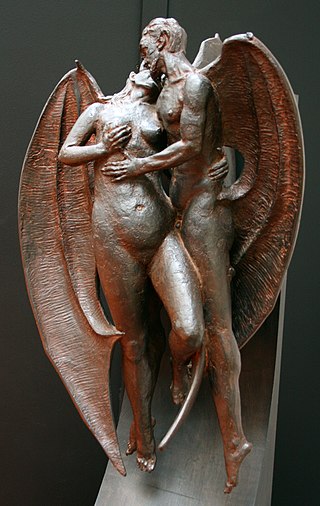
A devil is the mythical personification of evil as it is conceived in various cultures and religious traditions. It is seen as the objectification of a hostile and destructive force. Jeffrey Burton Russell states that the different conceptions of the devil can be summed up as 1) a principle of evil independent from God, 2) an aspect of God, 3) a created being turning evil or 4) a symbol of human evil.

Original sin in Christian theology refers to the condition of sinfulness that all humans share, which is inherited from Adam and Eve due to the Fall, involving the loss of original righteousness and the distortion of the Image of God. The biblical basis for the belief is generally found in Genesis 3, and in texts such as Psalm 51:5 and Romans 5:12–21.
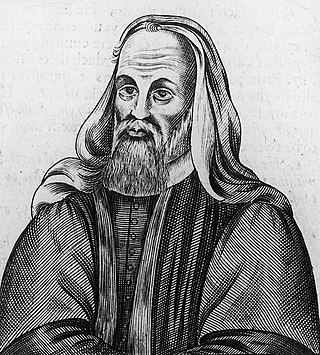
Pelagianism is a Christian theological position that holds that the fall did not taint human nature and that humans by divine grace have free will to achieve human perfection. Pelagius, an ascetic and philosopher from the British Isles, taught that God could not command believers to do the impossible, and therefore it must be possible to satisfy all divine commandments. He also taught that it was unjust to punish one person for the sins of another; therefore, infants are born blameless. Pelagius accepted no excuse for sinful behaviour and taught that all Christians, regardless of their station in life, should live unimpeachable, sinless lives.
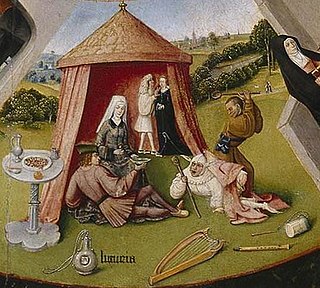
Lust is an intense desire for something. Lust can take any form such as the lust for sexuality, money, or power. It can take such mundane forms as the lust for food as distinct from the need for food or lust for redolence, when one is lusting for a particular smell that brings back memories. It is similar to but distinguished from passion, in that properly ordered passion propels individuals to achieve benevolent goals whilst lust does not.
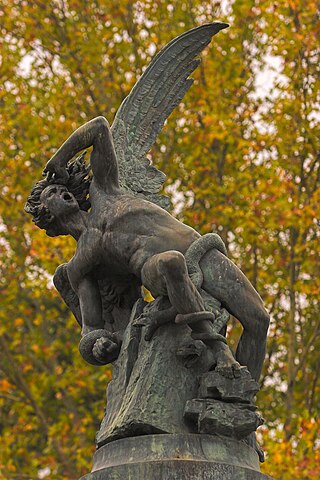
Fallen angels are angels who were expelled from Heaven. The literal term "fallen angel" does not appear in any Abrahamic religious texts, but is used to describe angels cast out of heaven or angels who sinned. Such angels often tempt humans to sin.
John Scotus Eriugena, also known as Johannes Scotus Erigena, John the Scot, or John the Irish-born was an Irish Neoplatonist philosopher, theologian and poet of the Early Middle Ages. Bertrand Russell dubbed him "the most astonishing person of the ninth century". The Stanford Encyclopedia of Philosophy states that he "is the most significant Irish intellectual of the early monastic period. He is generally recognized to be both the outstanding philosopher of the Carolingian era and of the whole period of Latin philosophy stretching from Boethius to Anselm".

Matthew 1:21 is the twenty-first verse of the first chapter in the Gospel of Matthew in the New Testament. Joseph is being spoken to in a dream by an angel. In this verse, the angel tells Joseph to call the child "Jesus", "because he will save his people from their sins".

In Islam, angels are believed to be heavenly beings, created from a luminous origin by God. The Quran is the principal source for the Islamic concept of angels, but more extensive features of angels appear in hadith literature, Mi'raj literature, Islamic exegesis, theology, philosophy, and mysticism.

The satisfaction theory of atonement is a theory in Catholic theology which holds that Jesus Christ redeemed humanity through making satisfaction for humankind's disobedience through his own supererogatory obedience. The theory draws primarily from the works of Anselm of Canterbury, specifically his Cur Deus Homo. Since one of God's characteristics is justice, affronts to that justice must be atoned for. It is thus connected with the legal concept of balancing out an injustice.

The Summa Theologiae or Summa Theologica, often referred to simply as the Summa, is the best-known work of Thomas Aquinas (1225–1274), a scholastic theologian and Doctor of the Church. It is a compendium of all of the main theological teachings of the Catholic Church, intended to be an instructional guide for theology students, including seminarians and the literate laity. Presenting the reasoning for almost all points of Christian theology in the West, topics of the Summa follow the following cycle: God; Creation, Man; Man's purpose; Christ; the Sacraments; and back to God.

Adam, in Islamic theology, is believed to have been the first human being on Earth and the first prophet of Islam. Adam's role as the father of the human race is looked upon by Muslims with reverence. Muslims also refer to his wife, Ḥawwāʾ, as the "mother of mankind". Muslims see Adam as the first Muslim, as the Quran states that all the Prophets preached the same faith of Islam.
Human nature comprises the fundamental dispositions and characteristics—including ways of thinking, feeling, and acting—that humans are said to have naturally. The term is often used to denote the essence of humankind, or what it 'means' to be human. This usage has proven to be controversial in that there is dispute as to whether or not such an essence actually exists.
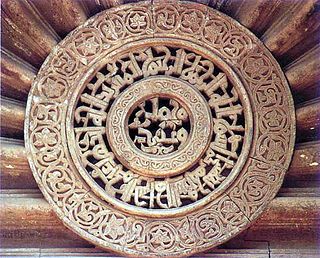
‘Iṣmah or ‘Isma is the concept of incorruptible innocence, immunity from sin, or moral infallibility in Islamic theology, and which is especially prominent in Shia Islam. In Shia theology, ismah is characteristic of prophets, imams, and angels. When attributed to human beings, ismah means "the ability of avoiding acts of disobedience, in spite of having the power to commit them". Along with a pure constitution, excellent qualities, firmness against opponents, and tranquility (as-Sakinah), ismah is a divine grace bestowed by God.
In Judaism, yetzer hara is a term for humankind's congenital inclination to do evil. The term is drawn from the phrase "the inclination of the heart of man is evil", which occurs twice at the beginning of the Torah.
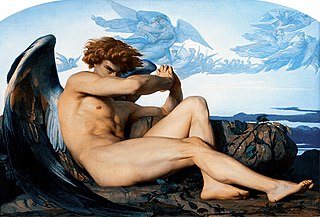
In Christianity, the Devil is the personification of evil. He is traditionally held to have rebelled against God in an attempt to become equal to God himself. He is said to be a fallen angel, who was expelled from Heaven at the beginning of time, before God created the material world, and is in constant opposition to God. The devil is conjectured to be several other figures in the Bible including the serpent in the Garden of Eden, Lucifer, Satan, the tempter of the Gospels, Leviathan, and the dragon in the Book of Revelation.
The theology of the Seventh-day Adventist Church resembles early Protestant Christianity, combining elements from Lutheran, Wesleyan-Arminian, and Anabaptist branches of Protestantism. Adventists believe in the infallibility of the Scripture's teaching regarding salvation, which comes from grace through faith in Jesus Christ. The 28 fundamental beliefs constitute the church's current doctrinal positions, but they are revisable under the guidance of the Holy Spirit, and are not a creed.

Allusions in rabbinic literature to the Biblical figure Adam, created according to the Book of Genesis by God in the Garden of Eden as the first man, expand and elaborate and draw inferences from what is presented in the text of the Bible itself.
Christian theology is the theology – the systematic study of the divine and religion – of Christian belief and practice. It concentrates primarily upon the texts of the Old Testament and of the New Testament, as well as on Christian tradition. Christian theologians use biblical exegesis, rational analysis and argument. Theologians may undertake the study of Christian theology for a variety of reasons, such as in order to:

Seven Mortal Sins, also known as Sin: The 7 Deadly Sins, is a Japanese anime television series animated by Artland and TNK that aired from April 14, 2017, to July 29, 2017. It is an adaptation of Hobby Japan's media franchise The 7 Deadly Sins, which primarily consists of a series of fantasy figures.














